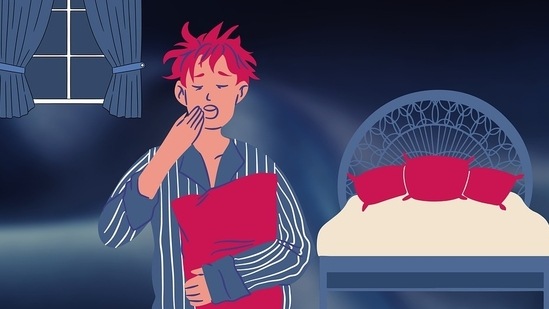From hindustantimes.com
Due to the pandemic related work from home (WFH) sleep disorders are becoming more common because of lack of activity, long work hours and loss of personal and professional boundary.(Pixabay)
Considering Covid-19 is still very much around and waves come and go, many workplaces are still encouraging work from home for the safety of their employees. However, being at home most of the times can invite an array of health issues and one of them is insomnia. According to research, up to 30-40% of people suffer from some form of sleep disorder. Due to the pandemic related work from home (WFH) sleep disorders are becoming more common because of lack of activity, long work hours and loss of personal and professional boundary.
"Everyone needs a restful 7-8 hours of sleep for normal functioning of our body. The quality of sleep is of paramount importance. There is increased risk of mental and physical illnesses if there is reduced quality or quantity of sleep," says Dr Santosh Banger, Senior Consultant Psychiatrist, Global Hospital, Parel, Mumbai.
Dr Banger elaborates on the reasons how working from home can disrupt our sleep cycle.
The expert says the blue-ray emitted by laptop or smartphones can reduce sleep. He adds that sedentary lifestyle is also one of the culprits. "Sedentary lifestyle in the pandemic led to lack of exercise. Exercise release ‘endorphins’, a feel good hormone. Exercise also promotes sleep if taken early in the day," says Dr Banger.
He says that due to long work hours in WFH, the boundary between personal and professional gets blurred and this may lead to less family time, and add to stress. "Sleep is best once one is in a relaxed state of mind," he says.
Tips to cope with sleep problems
1. Maintain a strict sleep-wake routine.
2. Try to put blinds/blackout curtains in the room to darken it. A cooler (20-22 degree celsius) bedroom promotes sleep.
3. Caffeine, smoking and alcohol should be avoided.
4. Use bed only to sleep rather than using it as workspace.
5. Exercising early in the day can be effective for good sleep. Avoid exercising three hours before your bedtime.
6. Try and avoid taking naps after 3 pm.
7. If you can't fall asleep in 20 minutes, get yourself engaged in reading a book or listen to soothing music.
8. Keep your body relaxed before going to sleep by taking a warm bath or putting lavender oil on your pillow.
9. Avoid excessive use of gadgets which emit blue rays like smartphones or TV at least 2-3 hours before bedtime.

No comments:
Post a Comment